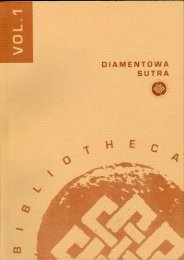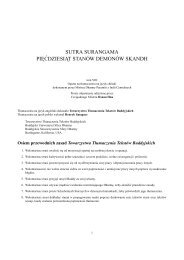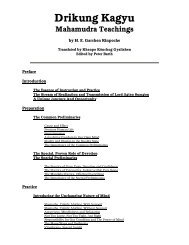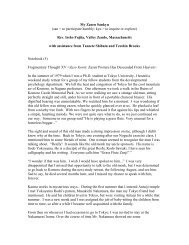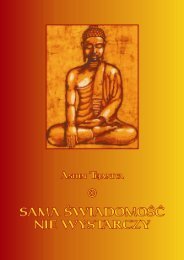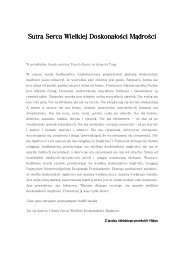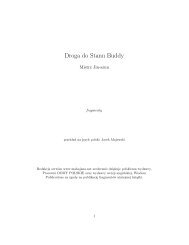3 - Computing in the Humanities and Social Sciences
3 - Computing in the Humanities and Social Sciences
3 - Computing in the Humanities and Social Sciences
You also want an ePaper? Increase the reach of your titles
YUMPU automatically turns print PDFs into web optimized ePapers that Google loves.
used, <strong>and</strong> so forth. Such a study would certa<strong>in</strong>ly br<strong>in</strong>g a major contribution to <strong>the</strong><br />
underst<strong>and</strong><strong>in</strong>g of <strong>the</strong> esoteric Buddhist episteme <strong>in</strong> premodern Japan <strong>and</strong> its actual<br />
devotional practices <strong>in</strong>volv<strong>in</strong>g signs <strong>and</strong> semiotic substances <strong>in</strong> general. We will return<br />
to this subject <strong>in</strong> a subsequent lecture.<br />
3. Pragmatic Aspects of <strong>the</strong> “Secret of Language”<br />
3.1. Gomitsu Practice as Speech Act<br />
The use of magic <strong>and</strong> ritual languages such as sh<strong>in</strong>gon <strong>and</strong> darani is often<br />
expla<strong>in</strong>ed, still today, by recourse to <strong>the</strong> concept of “sympa<strong>the</strong>tic magic” as def<strong>in</strong>ed by<br />
Frazer <strong>in</strong> <strong>the</strong> n<strong>in</strong>eteenth century. This concept presupposes a systematic confusion, on<br />
<strong>the</strong> part of <strong>the</strong> performers of magical utterances, of words <strong>and</strong> th<strong>in</strong>gs <strong>and</strong> <strong>the</strong><br />
superstitious belief <strong>in</strong> <strong>the</strong> action of <strong>in</strong>effable <strong>and</strong> mysterious potencies. In Japan,<br />
scholars often expla<strong>in</strong> sh<strong>in</strong>gon’s alleged power upon reality as <strong>the</strong> result of belief <strong>in</strong><br />
kotodama. The term, mean<strong>in</strong>g “<strong>the</strong> spirit of words,” appears for <strong>the</strong> first time <strong>in</strong> <strong>the</strong><br />
Man’yøsh¥, a collection of poems compiled <strong>in</strong> <strong>the</strong> second half of <strong>the</strong> eighth century. As<br />
far as we know, <strong>the</strong> ancient Yamato term kötö-tama referred to <strong>the</strong> belief that words were<br />
receptacles of supernatural power; accord<strong>in</strong>gly, <strong>the</strong> utterance of certa<strong>in</strong> words <strong>in</strong> certa<strong>in</strong><br />
cases could affect reality. As Herbert Plutschow has written,<br />
kotodama… <strong>in</strong>dicates <strong>the</strong> belief that word <strong>and</strong> th<strong>in</strong>g are ontically identical,<br />
that a word conta<strong>in</strong>s <strong>the</strong> power of <strong>the</strong> th<strong>in</strong>g it st<strong>and</strong>s for <strong>and</strong> if used <strong>in</strong> an<br />
appropriate manner <strong>and</strong> sett<strong>in</strong>g this sound would be uttered <strong>in</strong> order to<br />
summon <strong>the</strong> power of that th<strong>in</strong>g to control it or to appropriate its vital<br />
energies for <strong>the</strong> benefit of humans (Plutschow 1990: 11)<br />
This belief was related to an ancient world view that has not been yet clearly<br />
expla<strong>in</strong>ed. Scholars usually <strong>in</strong>terpret kotodama as a form of sympa<strong>the</strong>tic magic (see<br />
Miller 1977: 275), s<strong>in</strong>ce a word could cause <strong>the</strong> event or produce <strong>the</strong> object it referred<br />
(Yanabu 1972: 101). However, it is probably time to go beyond Frazer <strong>and</strong><br />
reconsider/re<strong>in</strong>terpret kotodama <strong>in</strong> more complex terms. New approaches are <strong>the</strong>refore<br />
34


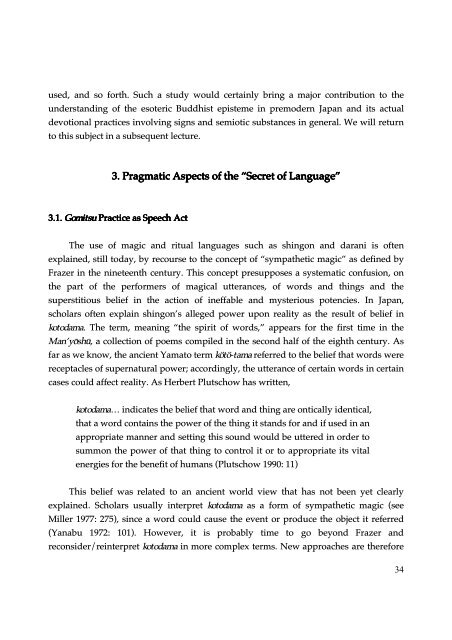
![Shushogi, Dogen Zenji [PDF] - Mahajana.net](https://img.yumpu.com/50921105/1/190x219/shushogi-dogen-zenji-pdf-mahajananet.jpg?quality=85)

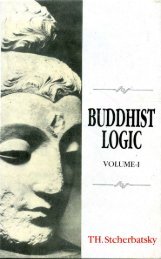
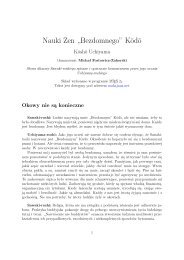
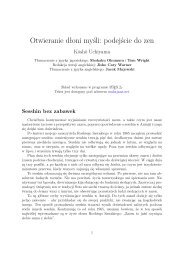
![wywiadu z Murakami Kosho Roshim [PDF] - Buddyzm w Polsce i na ...](https://img.yumpu.com/45809746/1/184x260/wywiadu-z-murakami-kosho-roshim-pdf-buddyzm-w-polsce-i-na-.jpg?quality=85)
